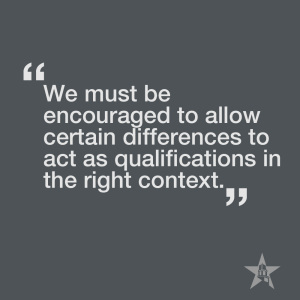This fall, California State University derecognized InterVarsity Christian Fellowship’s status as an official club on all 23 of their campuses. On what basis? On the basis that this Christian club was discriminating by requiring its leaders to commit to core beliefs. This was done by Cal State out of their commitment to diversity. In order for a club to be recognized on their campuses – entailing funding and access to spaces for gathering – the club must have an “all comers” policy for leadership roles.
 This seems absurd. The State University of New York at Buffalo (UB) had also derecognized this club in April 2012, but later acknowledged the absurdity of this action in a statement made upon the re-recognition of the club. They stated that “it is common sense, not discrimination, for a religious group to want its leaders to agree with its core beliefs.” I agree that it seems like common sense, but I would also say that it is justified discrimination. We must be allowed to, and even encouraged to, allow certain differences to act as qualifications in the right context.
This seems absurd. The State University of New York at Buffalo (UB) had also derecognized this club in April 2012, but later acknowledged the absurdity of this action in a statement made upon the re-recognition of the club. They stated that “it is common sense, not discrimination, for a religious group to want its leaders to agree with its core beliefs.” I agree that it seems like common sense, but I would also say that it is justified discrimination. We must be allowed to, and even encouraged to, allow certain differences to act as qualifications in the right context.
The idea that discrimination is wrong, as I understand it, is primarily rooted in the protection of human rights – and human rights should be protected! However, I think the affirmation of difference and recognition of uniqueness in the other can be humanizing. The act of distinguishing people can be done in such a way as to dignify. We often think of tolerance as being the alternative to discrimination, but if we understand discrimination as seeing difference, we would do better to discriminate and value a person’s differences than to tolerate them.
Cal State’s decision to derecognize InterVarsity Christian Fellowship was actually an act of discrimination, and surely Cal State does need to discriminate against clubs in which human dignity is being wounded and diversity is being compromised. But we must decide when discrimination should be discriminated against. I would argue that the discrimination by InterVarsity should not have been discriminated against.
Some have argued that this move by Cal State and other universities who have done the same does not change anything in practice. The clubs just have to sign “all comers” policies for leadership roles; but because of the democratic system in which the members of the club elect their officers, along with the selection bias of those who choose to join the club, it is argued that the officers will almost definitely be people who are committed to the core beliefs of the club anyway. This would most definitely be the case. So what’s the big deal?
Firstly, clubs should not be forced to sign absurd policies which they do not really believe in order to maintain their status as a recognized club. Secondly, the university is acting in contradiction to itself. As a Bloomberg editorial says, “It’s a way for the university to pledge allegiance to diversity without embracing pluralism.” Finally, we must consider the potential future implications that could come out of such a ruling.
If funding and recognition are withdrawn from on-campus clubs because they have qualifications for leadership that are explicitly tied to the mission of the club, where else might funding and recognition be withdrawn? Might other institutions that require leaders to be committed to some core set of beliefs be derecognized? While the particulars of the current circumstance may seem relatively insignificant, one can imagine what future implications this could have. That is why we must engage with this issue now. We must learn when to discriminate, and how to do so in a way that dignifies. Tolerance is rarely the answer, we must do more than tolerate. We must learn to better relate on a human level so that when we discriminate, when we see the differences, we can affirm them, and our relationships can flourish. If we can learn this, maybe institutions can too.
